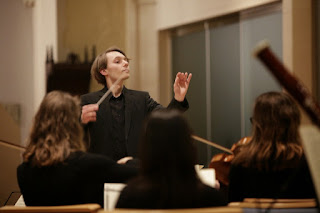 |
| Louis Spohr - self-portrait |
Rosalind Coad, Anna Harvey, Bradley Smith, Adam Green,
Cambridge University Music Society Chorus, Faust Chamber Orchestra, Mark Austin
LSO St Luke's
Reviewed by Ruth Hansford on Mar 4 2016
Star rating:
Spohr's rarely performed choral work performed by enterprising young ensemble
Two hundred years ago, following the death of Beethoven, Louis Spohr (1784-1859) was one of the most successful musicians alive. A prolific composer and busy performer and conductor (who was also responsible for the innovations of violin chin rests and rehearsal numbers in scores), he straddled the Classical and early Romantic periods, drawing his influences from Handel, Mozart and Beethoven and looking forward to Mendelssohn, Schumann, Brahms and Wagner. On 4 March 2016 at LSO St Luke's we had the chance to hear Spohr's major choral work, Die Letzten Dinge (The Last Judgment), performed by Cambridge University Music Society Chorus and the Faust Chamber Orchestra, conductor Mark Austin, with soloists Rosalind Coad, Anna Harvey, Bradley Smith and Adam Green at LSO St Luke's.
 |
| Mark Austin and the Faust Chamber Orchestra |
Die Letzten Dinge (The Last Judgment) was written in 1825 and first performed the following year in Kassel, where Spohr held the position of Kapellmeister from 1822 until the end of his long career. The text of the oratorio was felt to be too short, and so Spohr added a lengthy Overture and a Sinfonia to open Part 2, as well as other instrumental passages, to give the work 19 varied movements: arias with and without chorus, extended accompagnato recitatives, duets, quartets, great rousing choruses and tender choral prayers.
The German text was taken from the book of Revelations and adapted by the playwright Friedrich Rochlitz, a leading musicologist and music editor of the time. But unfortunately the text in our printed programme was an Edward Taylor’s 1844 singing translation for Novello. Anyone who didn’t know German had a double job to do.
This was a sacred work but intended to be performed outside a liturgical setting. Inevitably with an unfamiliar work, all ears were working hard to figure out what it was most like. What came to mind was a small-scale Elijah in terms of its variety and drama, and its direct emotional style.
The Faust Chamber Orchestra got into their stride after the Overture and first big choral number – once they had got used to the acoustic of the space. The strings were played with no vibrato but, to my ears, a little cheating on the vibrato front would not have gone amiss, to soften up the hard edges of LSO St Luke’s. The horns gave a portentous feel to the description of God on his heavenly throne surrounded by the elders (no. 3). There was some marvellous jazzy playing from the clarinets and flutes, especially in the Sinfonia that started off Part Two. The three trombones were magnificent in providing the backdrop to the destruction of Babylon (no. 15).
The 90-strong chorus made a big, full sound, though the German was not as accurate or idiomatic as it could have been, and final consonants not as tidy, ricocheting off the bare brick and metal of this square building. The tender, prayer-like numbers – the prayer at the end of Part One and the beautiful no. 16, ‘Selig sind die Toten’ – Blessed are the departed – worked better than the angry shouty ones, fun though these would have been to sing, especially the spectacular whooshing as they exalted the lamb (no. 6).
The soloists were very close to the audience. The baritone Adam Green had a major storytelling role but sang in schoolboy German rather than 'Bühnendeutsch', with 'isch' instead of 'ich', no differentiation between closed and open vowels nor glottals before initial vowels. He wasn’t the only one but he was the most exposed. Bradley Smith had a charming tenor voice and Rosalind Coad was a very poised soprano. The mezzo soprano Anna Harvey created exactly the right atmosphere, her rich sound, idiomatic German and calm, devotional stage presence making us wish Spohr had given her much more to sing.
Reviewed by Ruth Hansford
Recommended listening:
Louis Spohr Die letzten Dinge: Sally Matthews, Katharine, Koeldner, Jeremy Ovenden, Andrew Foster-Williams, Mozarteum Orchestra, Ivor Bolton
Elsewhere on this blog:
- Not a shooting star, but a well rooted planet: My interview with Ilona Domnich
- Highly personal Alice Coote, Christian Blackshaw in Schumann's Dichterliebe and Frauenliebe und -leben on Wigmore Hall Live - CD review
- Entrancing: Duets by Schumann, Mendelssohn, Peter Cornelius from Lucy Crowe & William Berger - CD review
- Musical values: Handel's Orlando with Iestyn Davies - opera review
- Saxon reserve and Italian passion: The Brook Street Band - concert review
- Strong revival: Puccini's Il trittico at Covent Garden - opera review
- Dramatic involvement: Verdi's Il trovatore from Chelsea Opera Group - opera review
- Youthful exuberance: The Sixteen in Handel's Dixit Dominus - concert review
- Distinctive voice: Michael Csanyi-Wills' songs with orchestra - CD review
- Somewhere over the rainbow: Song in the City celebrates LGBT History Month - concert review
- Heroique flashes: Bryan Hymel & Irene Roberts at Rosenblatt Recitals - concert review
- Home











No comments:
Post a Comment